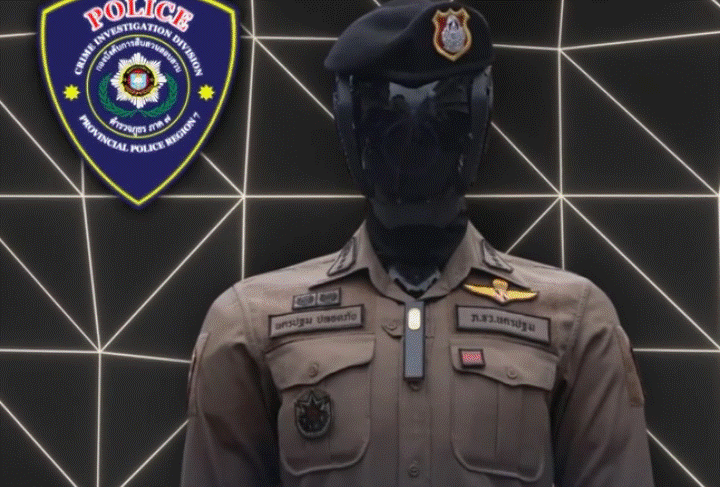NAKHON PATHOM — In a groundbreaking move blending tradition with cutting-edge technology, the Royal Thai Police unveiled its first intelligent AI-powered police robot — the AI POLICE CYBORG 1.0 — during this year’s Songkran Festival. Designed to enhance public safety at major events, the robot made its debut on Tonson Road in Muang District, Nakhon Pathom Province, and is named “Police Colonel Nakhon Pathom Plot Fay” — a name that loosely translates to “security” or “safety.”
This high-tech robot officer is not mobile for now, but it’s far from passive. Dressed in the same signature brown uniform as Thailand’s human police officers, the AI Police Cyborg is equipped with intelligent 360-degree surveillance cameras, facial recognition software, and advanced video analytics systems that can track and identify individuals in real time.
AI with Real-Time Command Connectivity
The system integrates real-time footage from nearby CCTV cameras, drones, and on-site surveillance devices, sending the data to the provincial Command and Control Center, where human officers receive live alerts on any suspicious or dangerous activity. Unlike traditional systems, this cyborg doesn’t just monitor movement — it actively analyzes behavior using onboard AI video chips.
Key features include:
- Facial recognition and blacklist matching
- Real-time tracking of persons of interest
- Behavioral detection (e.g., fights, pushing, or public disturbances)
- Object detection (e.g., weapons, knives, wooden sticks)
- Selective item filtering, smart enough to ignore water guns commonly used during the Songkran festivities
The system can also search based on clothing color, body type, and even gender, enabling precision monitoring across large crowds.
A Multi-Agency Collaboration
The AI Police Cyborg is the result of a joint initiative between Provincial Police Region 7, the Nakhon Pathom Provincial Police, and the Nakhon Pathom Municipal Administration. According to senior Thai officials, this marks the beginning of a new era in AI-enhanced public security, especially at large-scale public gatherings and festivals.
Part of a Broader Asian AI Policing Trend
Thailand is not alone in this AI policing transformation. In March 2025, Shenzhen, China, introduced its own line of humanoid patrol robots capable of interacting with pedestrians and responding to voice commands. The coordinated deployment of such smart systems across Asia suggests a growing regional race in AI policing technologies, as countries aim to boost urban security and surveillance efficiency.
Looking Ahead
Experts say that while the AI Police Cyborg raises questions around privacy and data ethics, it is expected to improve law enforcement response times, reduce crime during mass events, and support human officers with smarter decision-making tools. The Royal Thai Police has hinted at future mobile versions of the robot and a nationwide rollout, pending evaluation of its effectiveness during this Songkran pilot phase.
As the robot stood watch during Thailand’s most water-soaked holiday, one thing became clear: Asia’s future in public safety may very well be robotic. (zai)


